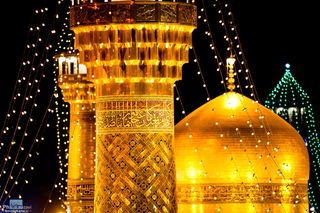Kashan Attractions
Agha Bozorg Mosque
This mosque and theological school (Madreseh Agha Bozorg) is located in the center of Kashan. The mosque consisted of two large "eivan", one in front of the "mehrab" and the other by the entrance. The courtyard has a second court in the middle which comprised of a garden with trees and a fountain. Surrounding the courtyard are arcades. The eivan in front of mehrab has two minarets with a brick dome. The colors of arcades and eivan are restricted to blue, red, or yellow against a brick ground.
Boroujerdi Residence
Used to be a private home but now is open to public as a museum. This house was built in the early 19th century and consisted of a beautiful courtyard, delightful wall paintings and very unusual wind towers which helps cool the house.
Bagh-e Fin
It is located a few kilometers southwest of Kashan, in the small village of Fin. This is one of the most famous gardens of Iran. This beautiful garden with its pool and orchards was designed for Shah Abbas I as a classical Persian vision of paradise. The original Safavid buildings have been substantially replaced and rebuilt by Qajar dynasty although the layout of trees and marble basins is close to the original. This gorgeous garden with remains of its two story palace is a pleasant spot to relax in the shade. This palace is also notorious as the sight of the murder of Mirza Taghi Khan known as Amir Kabir, chancelor of Naser o-Din Shah of Qajar in 1852.
Friday Mosque
Or Masjed-e Jomeh with its 11th century "mehrab" was built during Seljuq period and has been restored several times since then. This mosque also dates back to Timurid Dynasty (15th century) and has a minaret with some ancient inscriptions.
Tabatabaie Residence
It was built in the 19th century and consisted of a charming courtyard and beautiful windows with color glass panes. This is used to be a private home but now is open to public as a museum.
Tappeh-ye Sialk
The richest archaeological site in central Iran is the mound of the Tappeh-ye Sialk. This site was excavated by Ghirshman in the 1930s. The excavations revealed that the site is more than 7000 years old. Sialk was occupied from the fourth millennium BCE until the 8th century BCE. Probably, one of the most interesting findings are inscribed clay tablets dating back to the late 3rd and early 2nd millennium BCE. There are also some records showing immigrants and conquerors passing through this region and settling near Bagh-e Fin. The artifacts uncovered reside in the Louvre Museum in Paris and the archaeological museum in Tehran.
Niasar atashkadeh
From Kashan you can take a road west to Delijan (84 km.) at the junction of the main Isfahan road.
After about 15 km. from Kashan a track , goes off to the left for a few km. to the village of Niasar. Here , on a nearby hill , is a heavily restored Sassanian Atashkadeh or Chahar Taq of the type from which the sacred fire could be seen from a great distance , thus serving as a signal or beacon to travelers , as well as the focal point of religious ceremonies.
Although its precise date is not know , it is interesting to see that it makes clear use of a squinch in the zone of transition at the base of the dome.
A from of wide gallery also runs round the dome.



































